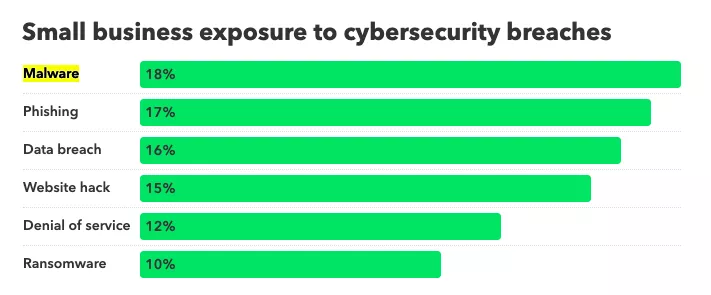The Ultimate Guide to Choosing Secure, Accessible, and Fast VPN Solutions for Small Business
Many small businesses have adopted remote work as an everyday practice since more than a quarter of workers prefer to work from home. The remote and hybrid work methods have multiple advantages like cut costs and better work-life harmony. But it also comes with a significant pitfall companies shouldn’t neglect which is data and connection security. While handling this challenge is possible, it’s important to pick the right tools and technologies for advanced protection. One such solution is a VPN for businesses. Read this article to find out how to use a VPN to stay away from hacks, data breaches, man-in-the-middle attacks, and other threats commonly targeted against small companies.

What is a business VPN?
A VPN is the technology that helps users stay private and unknown while they are online. The VPN service connects your traffic to a remote server and conceals your IP address. Your data travels through multiple secure channels that make it unreadable to unauthorized viewers like Wi-Fi administrators or Internet providers.
Some of the most common use cases of a VPN include the following:
- Unblocking websites
- Bypassing Internet censorship
- Improving Internet connection during streaming or gaming
- Protecting sensitive information from snoopers
But can it help a small business protect its critical data? Absolutely! Since a VPN creates a specific encrypted tunnel, running user data through it before reaching a certain server (website or app), it protects the information during this transfer. This additional communication channel makes it much harder for hackers to access any confidential details sent and received online.
Also, you might have heard that a virtual private network for business slightly differs from a regular VPN for personal use. So, how are they different, exactly?
The difference between personal VPN and business VPN solutions
The key difference between a personal (home) VPN and a business VPN lies in the number of users supported by the service, as well as the tool’s core goals. Here are some details.
| 🏢 Business VPN | 🏠 Personal (home) VPN |
| 👨💻 Business use: Commercial VPN solutions are designed to secure a company’s network and provide safe access to the necessary resources by encrypting users’ traffic. | 👨 Personal use: Personal VPNs provide access to the desired content, enhance your streaming experience, and ensure a greater level of online privacy and network security. |
| 👥 Many users: A company can use a small business VPN solution for multiple users within a single account to cover the needs of every employee. | 👤 Several users: A personal VPN mostly serves the needs of an individual or a family, being available for several devices with a single account. |
| 💼 Centralized management: A company can control and manage the use of a business VPN for remote access of business users. | 📲 Individual control: Users have complete access control over their VPN accounts. |
| 💰 Centralized payments: Payments are managed by the company. It’s also possible to add new users with automatic payment arrangements. | 💸 Individual subscription-based payments: A user chooses the most suitable subscription plan and pays for the service on a regular basis. |
| 🔓 Features for corporate use: Data encryption, two-factor authentication (2FA), Kill Switch, dedicated servers. | 🔐 Features for personal use: Data encryption, ad-blocking functionality, Kill Switch, Double VPN, Split Tunneling, Smart DNS. |
But note that for a small company with less than one hundred employees, an enterprise VPN solution isn’t really necessary. A reputable VPN for personal use, such as VeePN, offers adding extra devices to your subscription, meaning that it may serve as a feature-rich and affordable VPN for companies.
We will discuss this and other advantages of such a VPN solution for small businesses in a bit, but first, let’s figure out what kind of risks companies can overcome with its help.
Common security risks small businesses face
A survey conducted by Quickbooks shows that over 2,000 small US businesses deal with threats of malware, phishing, data theft, website intrusions, DDoS attacks, and ransomware.

Now we will consider the major security problems that small businesses currently experience daily.
Malware and viruses
Malware is any kind of harmful software installed on a user’s device to compromise the system (for example, it may steal sensitive data, such as passwords, and send it directly to cybercriminals from your computer).
With numerous types of viruses out there, small companies, especially the ones practicing full or partial remote work models, often deal with such threats. Just imagine that your employee’s personal laptop or smartphone gets infected with a particular form of malware. If they store any confidential information on it, your business’ safety is put at enormous risk. The most dangerous types of malware include trojans, worms, rootkits, spyware, and more.
Ransomware
This particular form of malware grew 62% worldwide and 128% in North America throughout the shift to remote work, as per a recent FBI report. If cybercriminals gain unauthorized access to a company’s sensitive data, they can hold this info for ransom. In this case, business owners are requested to pay a certain amount of money. Otherwise, malicious actors threaten to share this confidential data publicly.
For example, in 2021, a hacker group known as REvil hit the servers of Kaseya VSA, a popular remote network management platform, with a ransomware attack. As a result, 800 to 1,500 small businesses suffered from a massive security breach, losing their critical data.
Man-in-the-middle attacks
Remote employees often access sensitive data and communicate with their colleagues while connected to public Wi-Fi in cafes, restaurants, hotels, and so on. But as such networks usually lack some critical security measures, they become a popular target for hackers.
One of the most widespread types of cyber-threats on public Wi-Fi is a man-in-the-middle (MITM) attack. A malicious actor uses unprotected communication channels to put themselves between a user and the network, striving to access work servers or services this way. Wondering how common this danger is? You will be unpleasantly surprised. Recent research claims that MITM attacks represent approximately 35% of Wi-Fi exploitation activity.
Password hacking
Did you know that 53% of people reuse the same password for all their accounts? Most likely, many of those are small company employees, which is bad news for businesses and great news for hackers.
Credential theft and password-stuffing attacks aren’t new. But given how much confidential information a cybercriminal may steal by simply guessing someone’s Facebook or Google password things become scary. According to Statista, 20% of respondents admitted using work credentials to access websites and apps for personal needs.
Phishing
Phishing is a malicious technique where hackers trick users into clicking on a spoofed link in an email or text message. Once they do, they are taken to a shady website designed to steal their confidential data, such as passwords and other login credentials.
Small enterprises now face phishing threats much more frequently than before. Based on work by Barracuda Networks from 2022, smaller businesses with under 100 employees suffer 350% more social engineering attacks like phishing compared to workers at bigger companies.
DDoS and brute force attacks
If employees access their work accounts through their personal devices, they might lack protection against more direct threats, such as distributed denial-of-service (DDoS) and brute force attacks. It’s easier for a cybercriminal to take advantage of the company’s critical data or gain unauthorized access to its software through a hacked device or a compromised account. As for DDoS attacks, these refer to overloaded servers that may block online services and databases by overloading web servers.
These vulnerabilities are even more significant due to the following reasons:
- Almost half of modern businesses allow their employees to use personal devices for work.
- Workers tend to store confidential files on their devices without proper safety measures.
- Some employees fail to upgrade their operating systems and software, which causes weak device protection.
- Small businesses struggle to control their endpoints, which makes implementation of security practice harder.
Unencrypted communication
Communication between employees also poses cybersecurity risks if they use unencrypted channels while transmitting sensitive information online. Using common messaging apps like WhatsApp or Facebook Messenger to send confidential files or messages is extremely risky, as a hacker can easily access and steal this data.
With all these security challenges in mind, small business owners should look for effective, affordable, and flexible solutions to protect their data. And that’s where a reliable VPN service steps in.
Main reasons to use a VPN for small business
Here are the most compelling benefits of using a VPN for small business protection.
Encrypt confidential data
A VPN creates secure connections between business servers and external devices, preventing the risk of data leaks and third-party monitoring. It enhances remote work security, ensuring that employees won’t accidentally expose confidential information they transfer online.
Reliable VPNs use advanced encryption standards empowered with several tunneling protocols. It means that even if a hacker manages to access certain info, they will only see unreadable text transformed into a certain combination of numbers and characters.
Avoid public Wi-Fi risks
A VPN is an essential cybersecurity solution for those who tend to work while connected to insecure networks. Apart from encrypting your traffic, a VPN makes your online presence anonymous and ensures protection against some of the most common cyber-threats, including MITM attacks, DDoS attacks, phishing, and malware. A powerful feature like VeePN NetGuard helps avoid malicious websites, spoofed links, questionable files, and other dangers lurking across the web.
Apart from being a decent measure against hacking attempts, it also prevents other third parties from accessing your private data. When an employee is connected to a remote VPN server, Internet service providers (ISPs), Wi-Fi owners, and marketing agencies can’t log their traffic. As a result, they won’t be able to access your company’s data, even if workers use personal devices when dealing with it.
Gen an affordable and versatile security solution
Implementing advanced security measures can be expensive and resource-consuming – but that is not the case with a VPN. It’s a simple and convenient application that can be installed on every employee’s device in several simple steps. No specific training is required – using a VPN is as easy as pie. Moreover, premium VPN services like VeePN come with flexible pricing plans covering various user needs. Also, it’s possible to test the tool with a free trial or check whether it’s worth it with a money-back guarantee.
Enhance security on any device
Your employees use various types of devices and platforms when dealing with confidential data? No worries – most VPNs, including VeePN, offer solutions for all major operating systems, such as the following:
Moreover, you can cover up to 10 devices with a single subscription or even expand their number for minimal charge if necessary.
Prevent data and traffic limitations
It’s a well-known fact that a VPN slightly reduces Internet connection speeds due to the intensive data encryption process – that’s the price one should pay for enhanced privacy and security. But did you know that a VPN can actually improve your connection? ISPs can limit traffic and bandwidth for particular users when they are involved in data-heavy activities, such as transferring large files, using team collaboration platforms, or participating in multi-party video conferences.
A VPN eliminates this issue by hiding user data from their ISP. When Internet providers don’t know what a user is up to online, they have no reason to throttle their connection.
Now that you know how a small business can benefit from a VPN, it’s also important to mention that not all services are equal in terms of their safety, effectiveness, and approach to customer data. Let’s figure out how to pick the best VPN for small business remote access based on several key factors.
How to choose the best VPN solution for small business?
When choosing a small business VPN, pay special attention to the following aspects:
👤 Attitude to user privacy and secure access to the Internet
Pick a credible VPN service provider that follows a transparent No Logs policy. Simply put, it means that the VPN company doesn’t record, store, or sell customer data, including their connection and activity logs. Note that while free VPN options might sound tempting, may take advantage of your company’s confidential information (or even turn out malicious programs that infect devices with malware and spy on users).
🛡 The right VPN type
If most of your employees work remotely, a reputable VPN solution for Windows, Mac, or Linux will suffice. But if you need to cover your office’s network with reliable encryption, consider installing a router VPN or site-to-site VPNfor business.
⚡️ Connection performance and stability
Opt for a VPN that offers an extensive network of remote servers. The more servers are available, the less overloaded they will be. Accordingly, your workers won’t struggle with annoying lags, connectivity issues, and traffic limitations.
🔓 Data encryption
If data security is your main priority, choose a corporate VPN network that supports a strong and modern encryption standard, such as AES-256. Also, check whether your chosen service comes with the most stable and secure VPN protocols, including OpenVPN, IKEv2/IPsec, and WireGuard®.
⚙️ Additional features for the Internet access security
Check out the privacy and security features offered by a VPN for small companies. The essentials include anti-tracking functionality (like VeePN NetGuard), Kill Switch, Double VPN, and DNS Leak Protection.
💰 Offered value for money
Pick a VPN service that comes with flexible and affordable subscription options. Also, it should let you test the premium version of the app with a free trial or a money-back guarantee.
💁♂️ Customer support options
Finally, prioritize business VPN solutions that have helpful and efficient customer support service. Your options should include a 24/7 live chat, email, and troubleshooting guidelines or FAQ pages on the website.
Protect your sensitive business data with VeePN
Looking for a VPN that covers all the needs of a small business, from robust encryption and public Wi-Fi security to a large server network across the globe? Try VeePN – a reliable and trustworthy VPN for both personal and business use.
Our secure VPN for small businesses comes with the following benefits:
- AES-256 encryption
- Several VPN protocols for always-on VPN
- 2,500+ servers across 89 server locations worldwide
- All the essential VPN features, including Kill Switch and anti-malware protection function
- Compatibility with all major operating systems, mobile devices, and routers
- Antivirus and Breach Alert (included in the VeePN Security Bundle) for greater protection
- 24/7 live chat support
VeePN is available for up to 10 devices with a single subscription, plus you can expand the number of gadgets and add up to 100 units at $0.8 per each. Check out VeePN’s pricing plans and try it now with a 30-day money-back guarantee or opt for a free trial.
FAQ
Take the following steps to set up a reliable VPN for your small business:
- Choose a reputable service provider, such as VeePN.
- Prepare your network and remove legacy VPN if required.
- Install VPN software on all devices your employees use for work.
For more information on how to pick a secure VPN option for a small company and implement advanced network segmentation for higher protection, check out this blog post.
It depends on the pricing plans offered by a particular VPN provider. For example, VeePN offers flexible subscription options that include 1-month, 1-year, and 5-year plans. Many offer centralized billing when a single subscription covers up to 10 devices, plus you can add up to 100 devices with a minimal extra charge per each. Feel free to explore the available options on the VeePN website.
Absolutely! A VPN protects a company’s entire network from various cyber-threats, including third-party monitoring, malware, DDoS attacks, and data theft. It covers the Internet traffic with reliable encryption, preventing unauthorized access to confidential information. Besides, it’s a convenient and lightweight solution your remote workers can quickly adapt to. Read this article to explore the key benefits of a VPN for small businesses.
VeePN is freedom
Download VeePN Client for All Platforms
Enjoy a smooth VPN experience anywhere, anytime. No matter the device you have — phone or laptop, tablet or router — VeePN’s next-gen data protection and ultra-fast speeds will cover all of them.
Download for PC Download for Mac IOS and Android App
IOS and Android App
Want secure browsing while reading this?
See the difference for yourself - Try VeePN PRO for 3-days for $1, no risk, no pressure.
Start My $1 TrialThen VeePN PRO 1-year plan








